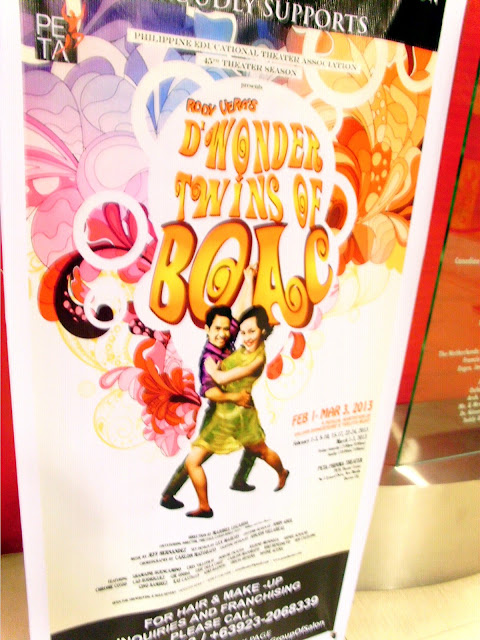Following a desperate attempt on actual Filipino theater, my first PETA experience finally took place last Saturday night on the glittering streets of Eymard Drive in New Manila, in which D' Wonder Twins of Boac was showing on its first week. For some reason in which I was not supposed to be involved, I received an 80% discount on the ticket - the kind of luck that willfully drove me not to miss out on quite an opportunity.
The minute the doors were opened and I was ushered into what in theater vocabulary is a full house, I was instantly aroused by the small hall that enclosed an arena stage. I saw when the play began that the theater in the round provided the production a delightful synergy with the audience. That was when I found myself sitting next to Kenneth, the nine-year old kid of one of the caterers, and who claimed to have watched the play twice already. Yet, he persists.

Written by ingenious playwright Rody Vera, D' Wonder Twins of Boac is an adaptation of William Shakespeare's 12th Night, set in the 60's during the decline of Philippine Cinema's Golden Years, bedazzled with the unfailing loyalty of a musical that parodies the evolution of Philippine film industry.
Once the show put on its green lights, it couldn't be stopped. Not even the slightest kilo-joule of energy was lost. It deemed only the strong, right reactions, without dead air in attendance. Alas was the unraveling of passion, of secret desires and ulterior motives, the unhinging of personal interests, the offering of diverse business perspectives, unscrewing of egotism and self-rightousness, while underneath, all along, lurked the deterioration of an industry that was escorted stage left for its final exit.

One thing that I found interesting was the incorporation of the multi-media on the stage: a television screen hanging from the ceiling that subtlely dramatized the most striking acts such as the shipwreck of the twins Viola and Bastian, the slow rise of Cesar in the industry, even the bitter rivalry between Sampaguita Films and BLV Pictures. The idea fit just as well within the concept.
I think that the biggest factor that makes Boac quite easy to love is the new life that the actors breathed into their characters. We could still identify them in some of today's most powerful and influential Filipinos. It was a wholesome cast that knew their place onstage without outweighing the other. From beginning to end, not one of them fell out of persona, even off-scene. My personal favorite is the eccentric character of Malovolio, brilliantly played by Lao Rodriguez. Then there were Bastian and Antonio, and the bromance that hung over me in the morning that followed the experience.
 |
| Chrome Cosio as Bastian |
 |
| Riki Benedicto as Antonio |
Director Maribel Legarda describes Boac as "not simply a period play". Call it a lesson on Filipino film or an classic that is only really meant to entertain the society that could easily identify with the business warfare of film. Beyond those, D' Wonder Twins of Boac is a recollection, a reminder, a "meaning" of the What Was Then that clicked so nicely with the Filipino film industry. It was a witness to the comings (and fadings) of stars, a classic battle royale of producers, vantage points, love and dreams detonating in disarray.



No comments:
Post a Comment